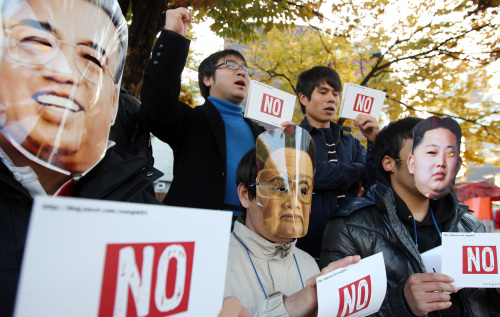While escalating reconciliatory gestures toward Seoul and Washington, North Korea appears to have restarted suspicious activities at its nuclear site, employing the two-track strategy that caused the world so much distress in the past.
Just days after families separated by the 1950-53 Korean War reunited at North Korea’s scenic resort as a result of easing inter-Korean tensions, reports unveiled new construction activities at the communist state’s Yongbyon nuclear complex, sparking concerns that it has begun rebuilding a cooling tower to restart producing plutonium. Pyongyang had dismantled the tower under a 2008 agreement made during the six-nation talks aimed at its denuclearization.
In a meeting with reporters in Washington, Jack Pritchard, president of the Korea Economic Institute who recently visited the North, said Pyongyang was building “what it claims to be an experimental light-water reactor for completion by 2012.”
Pritchard, former U.S. special envoy on North Korea policy, had visited the country last week, meeting with Pyongyang’s chief nuclear envoy and touring around the Yongbyon nuclear complex.
The alleged light-water reactor is “physically slightly in front of where the old cooling tower was located,” Pritchard said.
In a meeting with Seoul officials last week, the U.S. expert had said the facility “might or might not be related to nuclear activities,” adding North Korea “said it was continuing to enrich uranium for peaceful purposes.”
Adding to the concerns, the North’s ruling Workers’ Party refused, in a recent statement, to allow international nuclear monitors back into the country, indicating its ongoing nuclear ambitions.
Just days after families separated by the 1950-53 Korean War reunited at North Korea’s scenic resort as a result of easing inter-Korean tensions, reports unveiled new construction activities at the communist state’s Yongbyon nuclear complex, sparking concerns that it has begun rebuilding a cooling tower to restart producing plutonium. Pyongyang had dismantled the tower under a 2008 agreement made during the six-nation talks aimed at its denuclearization.
In a meeting with reporters in Washington, Jack Pritchard, president of the Korea Economic Institute who recently visited the North, said Pyongyang was building “what it claims to be an experimental light-water reactor for completion by 2012.”
Pritchard, former U.S. special envoy on North Korea policy, had visited the country last week, meeting with Pyongyang’s chief nuclear envoy and touring around the Yongbyon nuclear complex.
The alleged light-water reactor is “physically slightly in front of where the old cooling tower was located,” Pritchard said.
In a meeting with Seoul officials last week, the U.S. expert had said the facility “might or might not be related to nuclear activities,” adding North Korea “said it was continuing to enrich uranium for peaceful purposes.”
Adding to the concerns, the North’s ruling Workers’ Party refused, in a recent statement, to allow international nuclear monitors back into the country, indicating its ongoing nuclear ambitions.

North Korea, which has recently started to transfer power from the ailing dictator Kim Jong-il to his youngest son Jong-un, is “likely to maintain the so-called two-track method even after succession,” an official at Seoul’s Unification Ministry said.
“The method, in the past, has often been effective in securing outside assistance for the North,” the official said, asking not to be named due to the sensitivity of the issue.
“We must spare equal attention to both matters ― whether the North is really preparing to conduct another atomic test or whether it is deliberately leaking such information to gain the upper hand in negotiations,” said the unnamed official.
Pyongyang, which has relied mostly on outside assistance to feed its impoverished population of some 24 million, has recently been expressing hopes of restarting the stalled denuclearization talks. At the end of 2008, North Korea left the aid-for-denuclearization dialogue it had held with the U.S., South Korea, Japan, China and Russia since 2003, conducting a second nuclear test shortly afterwards.
Reportedly suffering from deepening food shortages, Pyongyang is apparently growing desperate to secure more outside assistance and recover ties with Seoul, which was its largest donor for nearly a decade until 2008, analysts say.
With dialogue partners agreeing the two Koreas should discuss their own issues before resuming the six-nation talks, some experts here are calling on the need of another inter-Korean summit.
The conservative, pro-U.S. Lee Myung-bak government, however, appears skeptical and determined not to be influenced by Pyongyang’s escalating two-track method.
“Theoretically, there is no reason for us to refuse to hold the summit if it really plays a role in improving the inter-Korean ties,” Seoul’s Foreign Minister Kim Sung-hwan said during a recent meeting with reporters. “But we must consider whether the talks will actually be effective. For this, some basic conditions must be fulfilled.”
The minister also emphasized South Korea maintains the position that Pyongyang must first come clean on attacking a Seoul warship earlier this year and put into action its willingness to denuclearize for any “actual discussions” at the government-level.
“We have wasted so much time already. We need to have the basis stably formed for any kind of effective negotiations,” Kim said.
Blaming North Korea for sinking its warship Cheonan and claiming the lives of 46 sailors in March, the South Korean government has said it will freeze all dialogue and aid until Pyongyang admits and apologizes for the action. Seoul is also negative toward an early resumption of the six-party talks.
While playing down the possibility of North Korea actually preparing to conduct a third atomic test, Minister Kim said “any kind of construction in Yongbyon would be violating the U.N. resolution” and “not helping the current circumstances.”
“All our policies and measures must be aimed at persuading North Korea to make actual changes,” said Kim.
By Shin Hae-in (hayney@heraldcorp.com)







![[KH Explains] Hyundai's full hybrid edge to pay off amid slow transition to pure EVs](http://res.heraldm.com/phpwas/restmb_idxmake.php?idx=644&simg=/content/image/2024/04/18/20240418050645_0.jpg&u=20240419100350)






![[From the Scene] Monks, Buddhists hail return of remains of Buddhas](http://res.heraldm.com/phpwas/restmb_idxmake.php?idx=652&simg=/content/image/2024/04/19/20240419050617_0.jpg&u=20240419175937)

![[KH Explains] Hyundai's full hybrid edge to pay off amid slow transition to pure EVs](http://res.heraldm.com/phpwas/restmb_idxmake.php?idx=652&simg=/content/image/2024/04/18/20240418050645_0.jpg&u=20240419100350)

![[Today’s K-pop] Illit drops debut single remix](http://res.heraldm.com/phpwas/restmb_idxmake.php?idx=642&simg=/content/image/2024/04/19/20240419050612_0.jpg&u=)